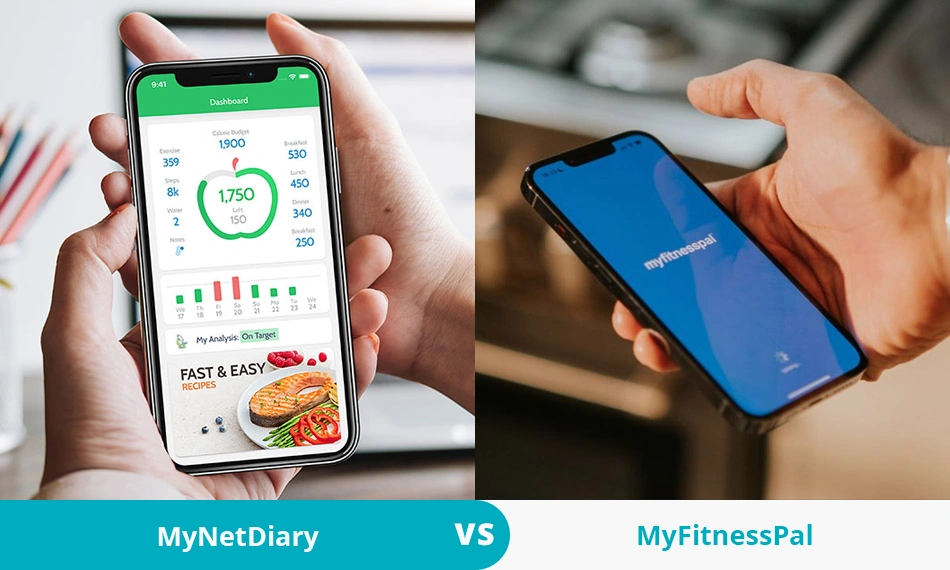How do we vet brands and products? Learn more.
MyNetDiary vs. MyFitnessPal: Which Is the Best Calorie Counter?
Calorie counter apps are useful tools for achieving your weight goals, but choosing the right one out of many can be tough. In this article, I uncover the differences between two leading options: MyNetDiary vs. MyFitnessPal.
A digital calorie counter can be a valuable tool in maintaining dietary discipline. One effective approach to monitoring calorie consumption is to use one of the many weight loss apps available in the Android and iOS app stores.
Two of the most popular calorie tracker apps are MyNetDiary and MyFitnessPal. They share many of the same features for keeping track of your daily food intake, and both offer a free and a paid version so anyone can use them.
I put both apps to the test to uncover the similarities and differences between MyNetDiary vs. MyFitnessPal so that you can choose the one that best fits your needs and budget.
MyNetDiary vs. MyFitnessPal: Which Is Better?


Extensive food database
Calorie counter
Exercise diary
Detailed meal plans
Easy-to-follow workouts
Integrates with other health and fitness trackers
Free version
Available for iOS and Android devices
Extensive food database
User-friendly calorie counter
Exercise diary Personalized meal plans
Foods graded according to nutritional value
Support from online community monitored by registered dietitians
Available for iOS and Android devices
Large ads on the free version
The paid version can be expensive
Navigation is slow
The barcode scanner doesn’t recognize all foods
Ads on the free version
Macro tracking is only available on the premium version
Macronutrients are not calculated per meal
Virtual coach is generic and not backed by humans
After thoroughly researching MyNetDiary vs. MyFitnessPal, I believe that MyFitnessPal comes out on top. The pros and cons of both calorie counting apps are listed in the table below.
What is MyNetDiary?

- Extensive database with over 1.25 million approved foods
- User-friendly calorie counter
- Foods graded according to nutritional value
- Meal ideas and recipes
- Tracks activity, water, blood glucose, and medicine
MyNetDiary is a comprehensive and easy-to-use app to keep track of how many calories you eat. It includes an extensive database of foods that are graded according to the nutritional information available for each food item to guide you towards eating healthier weight loss foods.
The main feature is the calorie counter; however, the app offers fitness, water, blood glucose, and medication tracking. It can sync with fitness devices and other apps to simplify data entry and provide an overview of your progress.
-
Extensive food database
-
User-friendly food diary
-
Exercise, water, blood glucose, and medicine tracking
-
Calorie-specific meal plans
-
Extensive support from online community monitored by registered dietitians
-
Free version available
-
Available for iOS and Android devices
-
Adds on the free option
-
Macro tracking is only available on the paid version
-
Virtual coach is generic and not backed by humans
What is MyFitnessPal?

- Extensive database of foods
- Detailed meal plans
- Calorie counting
- Exercise tracker
- Easy-to-follow workouts
MyFitnessPal is a popular and versatile calorie counter and fitness tracking app. The app offers personalized profiles, a barcode scanner to simplify calorie tracking, goal setting, and macro and micronutrient nutritional insights.
Your personal information is kept safe and used to establish your calorie budget to help you lose weight and boost your fitness.
You are also encouraged to connect with friends to share your progress, improve your motivation, give encouragement, and provide accountability to each other. The extensive support offered by the MyFitnessPal community can help keep you on track.
-
Extensive database of foods
-
Intuitive calorie counter
-
Exercise tracking
-
Detailed meal plans with a personalized calorie budget
-
Integration with other health and fitness apps and trackers
-
Free version available
-
Available for iOS and Android devices
-
Large ads on the free option that interfere with the user experience
-
Paid premium version can be expensive
-
The barcode scanner doesn’t recognize all foods
MyNetDiary vs. MyFitnessPal: Features
The best weight loss apps, like MyNetDiary and MyFitnessPal, share many useful features, such as those listed below:
- An extensive food database
- A barcode scanner, which scans the barcode on products to automatically log your calories and calculate the nutritional values of your diet
- Weight tracking
- Exercise tracking
- Recording your daily water intake
- Calculated calorie budget
- An extensive collection of healthy recipes
- Community and social features for added motivation, accountability, and support
- Syncing with other health and fitness wearables and apps
When comparing MyNetDiary vs. MyFitnessPal, it is clear that although they are both calorie counting apps, each offers other unique features that may make them more appealing to you. Let’s take a look at those for both products.
MyNetDiary:
- Diabetes tracking: MyNetDiary allows people with diabetes to track medication and blood glucose levels via integration with their glucometer. It also provides glycemic index and glycemic load information for foods.
- Food grading system: Foods are given a grade based on their calorie content and nutritional value so that you can focus on eating healthy weight-loss foods, not only focusing on calories.
MyFitnessPal:
- Restaurant logging: MyFitnessPal allows you to log meals from popular restaurant chains, providing nutritional information for menu items.
- Challenges and goals: MyFitnessPal offers various challenges and goal-setting features to help you stay motivated and engaged in your health and fitness journey.
- Offline access: The app provides limited offline access, allowing you to log meals and activities when the internet is not available.
Benefits
Although both apps offer unique features, they also share similar benefits.
- Weight loss: People who record calories and track their dietary intake have been shown to enjoy consistent and long-term weight loss.
- Calorie requirements: The apps help you calculate your calorie budget.
- Exercise tracker: Research suggests that it may increase your motivation to exercise, the enjoyment of your workout, your fitness level, and your health and well-being.
- Portion control: When you know the calorie content of the food you’re eating, it becomes easier to watch your portion sizes.
Downsides
Calorie counting isn’t for everyone, and even the best weight loss apps share the following downsides:
- A focus on calories rather than healthy meals, which may result in eating disorders
- Not considering individual variations in factors such as metabolism and gut microbiome
- Logging everything, which can be impractical and time-consuming
- Lack of consideration regarding health conditions
As with certain features and benefits, there are specific downsides when it comes to MyNetDiary vs. MyFitnessPal:
MyNetDiary:
- Generic virtual health coach, making it impossible to get personalized advice
- No personal motivation features
MyFitnessPal:
- Bugging barcode scanner, which may increase the time it takes to log your meals
- Large ads on the free option, which affect the user experience
Pricing
MyNetDiary and MyFitnessPal both offer a free option of the app so that you can try it out before committing to the paid version. Of course, the premium version adds significant features to both calorie counters.
MyNetDiary: A monthly payment of $6.50 gives you access to customized nutrient goals, comprehensive nutrient tracking, and personalized meal plans.
MyFitnessPal: For a monthly fee of $19.99 or an annual payment of $79.99, you get access to features such as barcode and meal scanning, macro tracking with personalized goals, and guided meal and workout plans.
MyNetDiary vs. MyFitnessPal vs. Alternatives
There are several alternative apps to MyFitnessPal and MyNetDiary that offer similar features, such as Weight Watchers (WW) and Perfect Body. See how other apps compare to MyNetDiary and MyFitnessPal in the table below.











Suitable for beginners and pros
Choice of 3 monthly pricing options
Easy navigation
100% science-based
No equipment needed
Workouts can be performed anywhere, at any time
Multiplayer option
Simple, user-friendly interface
Smart camera allows you to detect multiple foods at once
Connects with multiple apps and devices
Meal plans are designed by nutritionists
Ingredients for meals can be found easily in grocery stores
Web version available
Recommended by doctors
Programs are easy to follow
Expert coaches and members community provide support
Free version available
You can set your own macronutrient intake
Sync with a wide range of apps and devices
Created by experts in behavioral science
Habits can easily be fit into a busy schedule
Can choose your own goals and custom reminders
Extensive food database
Calorie counter
Exercise diary
Detailed meal plans
Easy-to-follow workouts
Integrates with other health and fitness trackers
Free version
Available for iOS and Android devices
No equipment needed
Workout from anywhere
Free to sign up
Doesn’t restrict any food groups
Teaches users why they are making changes
Can adjust your goals easily
Premium version offers a 90-day free trial
Encourages you to reach your step count with regular reminders
Integrates with many other apps
Suitable for a range of dietary requirements
Can be personalized to suit your preferences
Sync between all of your devices
Use with other popular apps, like Apple Health
Keeps your profile private with a passcode
Extensive food database
User-friendly calorie counter
Exercise diary Personalized meal plans
Foods graded according to nutritional value
Support from online community monitored by registered dietitians
Available for iOS and Android devices
No free trial offered
Premium features cost more
Smaller food database than other weight loss apps
Ads on the free version
Need a premium subscription to access more features
No free trial
Unsuitable for those who are pregnant or breastfeeding
Virtual or in-person workshops aren’t for everyone
App interface can be hard to navigate
The weight loss app itself isn’t run by physicians
Premium features only available on the Gold version
Users may choose the wrong macronutrient ratio for their goals
Requires a monthly subscription
Not compatible with smartwatches
Large ads on the free version
The paid version can be expensive
Navigation is slow
The barcode scanner doesn’t recognize all foods
Free app only offers a limited collection of classes
Memberships are quite pricey
Recommends that users weigh themselves daily
Relatively expensive
No custom meal plans
Requires a Fitbit tracker or smartwatch to work
Stats aren’t always 100% accurate
No personalized meal or training plans available
No personalized fitness programs
Users can add to the food database, so it may not be accurate
Only offers basic nutritional information
No fitness or nutritional information
Can only track weight loss
Ads on the free version
Macro tracking is only available on the premium version
Macronutrients are not calculated per meal
Virtual coach is generic and not backed by humans
How I Tested the Products
I tested calorie counter apps in the same way we at Health Reporter determine the best weight loss supplements. Therefore, when comparing MyNetDiary vs. MyFitnessPal, I examined the following criteria:
Quality
The user experience is key in determining the quality of an application, and in this case, the accuracy of the food database must also be considered.
Effectiveness
The effectiveness score is based on user reviews. Many people find these apps useful for losing weight. However, how well they work depends on how frequently you use them and how accurately you record your food intake.
Price
Whether you choose to use the free or premium version of MyNetDiary and MyFitnessPal depends on how much support you feel you need to achieve your goals. While the free versions are useful, the paid plans offer significantly more features.
Brand reputation
A reputable brand consistently delivers high-quality products. In the case of MyNetDiary and MyFitnessPal, both companies have ensured that you have access to an extensive food database providing accurate nutritional information.
FAQs
The main difference between MyNetDiary and MyNetDiary Pro is more advanced macro and micronutrient tracking, which provides more nutritional information. You can also customize your goals and use the calorie counter offline with MyNetDiary Pro.
Based on user reviews, MyNetDiary is good for weight loss. A scientific study also found that MyNetDiary and MyNetDiary Pro were good for promoting the behavior change required for losing weight.
Find the app on the MyFitnessPal website.
Research has found that MyFitnessPal is accurate for calculating your calorie intake, carbohydrates, protein, fat, sugar, and fiber.
A Word From Our RD
If you’re looking for a weight loss program to help you lose weight fast, calorie counter apps probably won’t get you the results you want. However, they can be beneficial if you find it useful to keep track of your calories while dieting.
Counting calories offers several benefits for people wanting to lose weight. However, there are numerous reasons why it doesn’t work for everyone. One of the biggest drawbacks is the focus on calories instead of healthy eating.
When studying the impact of calorie-based consumer education, scientists found that it is less effective for losing weight than teaching people about the type of food they should be eating.
On the other hand, people who track calories using weight loss apps have been shown to lose weight more successfully than those who don’t track their progress.
Whether you choose to keep a written food diary or make use of a calorie counter app, you must make sure that you have chosen the best diet for you. It must meet your nutritional requirements and fit into your lifestyle to improve your chances of success.
Conclusion
After comparing the features of MyNetDiary and MyFitnessPal, I think MyFitnessPal offers the most benefits with only a few inconsequential downsides.
The choice is yours, though. Although the apps offer similar benefits and features, the calorie counter you choose to track your calorie intake must meet your requirements and your budget.

















































 Select your language:
Select your language: 













